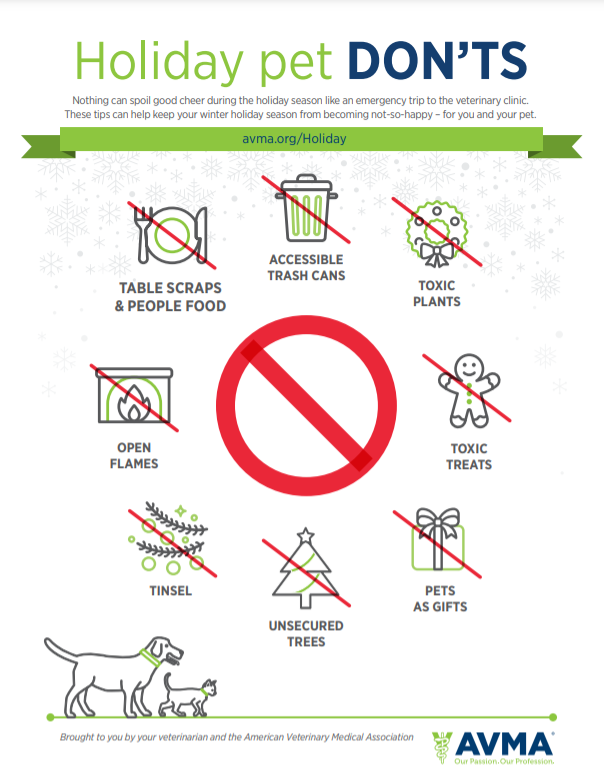Denise Derrer, BOAH Public Information Director
(This article was originally released by the Indiana State Board of Animal Health in 2019.)
INDIANAPOLIS (19 November 2019)—The holiday season is filled with special food, decorations and gatherings with relatives and friends. Some of that fun can be dangerous to pets. Each year many pets are rushed to emergency veterinary clinics over the holidays after often-preventable mishaps with food or decorations.
Dr. Melissa Justice, a veterinarian with the Indiana State Board of Animal Health, said, “Take a few minutes to correct any hazards to your pets by looking around your home from their level. Pay attention to temptations, like food or places to hide or climb. Then, have an emergency plan, in case your pet needs medical help outside of normal business hours.”
Plan in advance by finding the nearest 24/7 emergency veterinary clinic before an emergency occurs. Have phone numbers on hand for your veterinarian, the emergency veterinary clinic and the ASPCA Poison Control Hotline: 1-888-426-4435.
Here are a few tips for keeping pets safe Dr. Justice offers for this holiday season:
Food
If you like to share treats with your pets, give them treats made for pets. Traditional holiday foods can be dangerous to animals. Avoid feeding them foods that are sweet, salty, fatty or spicy. Foods that are particularly dangerous to pets include: eggnog, chocolate, onions, yeast, alcoholic beverages, grapes, raisins, nuts, poultry bones, and sweets that contain xylitol. Each holiday season many pets are taken to emergency veterinary clinics with bones in their stomachs or severe stomach pain from holiday food.
Visitors
The noise and excitement of holiday parties can upset pets. Even pets that are not normally shy can become nervous around visitors. All pets should have access to a comfortable, quiet place where they can get away from the party. Animals that get nervous or excited around visitors should be housed in a crate with a familiar toy during the party. Be sure to watch the door and do not let pets slip outside as guests arrive and leave. Having animals properly identified with tags or microchips helps reunite lost pets with owners.

Decorations
Decorations are beautiful and make the holidays more festive, but they also pose a threat to pets. Christmas trees can tip over and water additives for trees can be hazardous to pets, if ingested. Try securing trees so they do not topple and place barriers around tree water. Ornaments, tinsel and other holiday decorations can cause intestinal blockages if ingested. Potpourris can cause damage to a pet’s mouth, eyes, skin and digestive tract. Electrical lights and cords can cause burns and electrocution if chewed on. Be sure to unplug electoral cords when away from home.
Plants
Plants are beautiful, but some plants are toxic to pets if ingested. Toxic holiday plants include: holly, mistletoe, poinsettia, pine, cedar, balsam and amaryllis. These plants should be kept out-of-reach of pets.
Traveling
When possible, leave pets at home or with a trusted caretaker (kennel or friend). Unfamiliar locations and people with all the holiday hub-bub can cause stress. Also, destinations should be pet-proofed too.
Animals in vehicles should always be safely restrained with a harness or carrier in a location clear of airbags. Pets traveling interstate or internationally will need to get a certificate of veterinary inspection from a veterinarian.
Holiday festivities are fun, but can quickly become scary when an emergency occurs. Taking simple precautions to keep pets safe reduces the risk of animal emergencies over the holidays.
If you need more information contact: inprepared@purdue.edu.
© 2020 Purdue University | An equal access, equal opportunity university | Extension Intranet
615 West State Street, West Lafayette, IN 47907-2053
If you have trouble accessing this page because of a disability, please email us at extension@purdue.edu.

